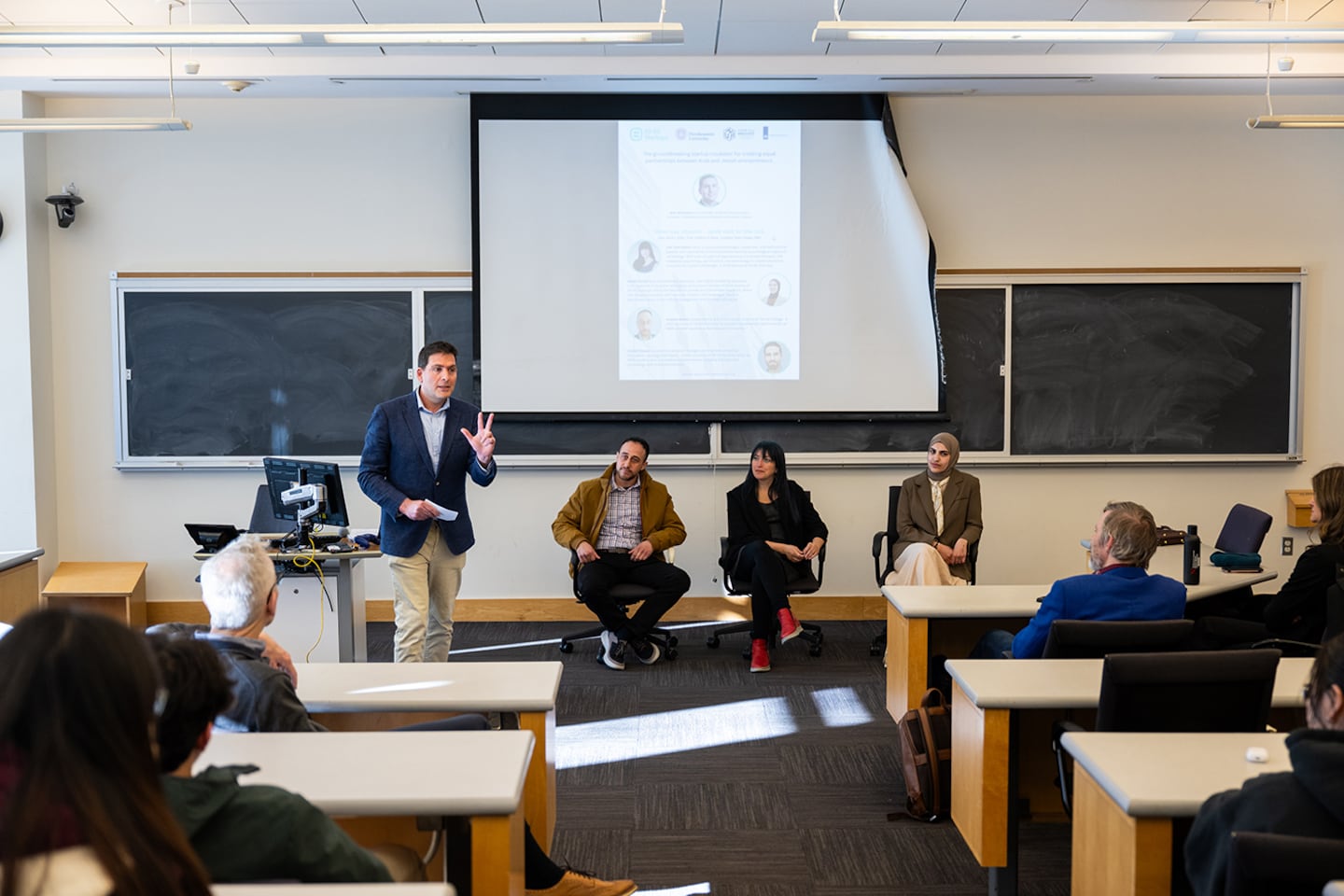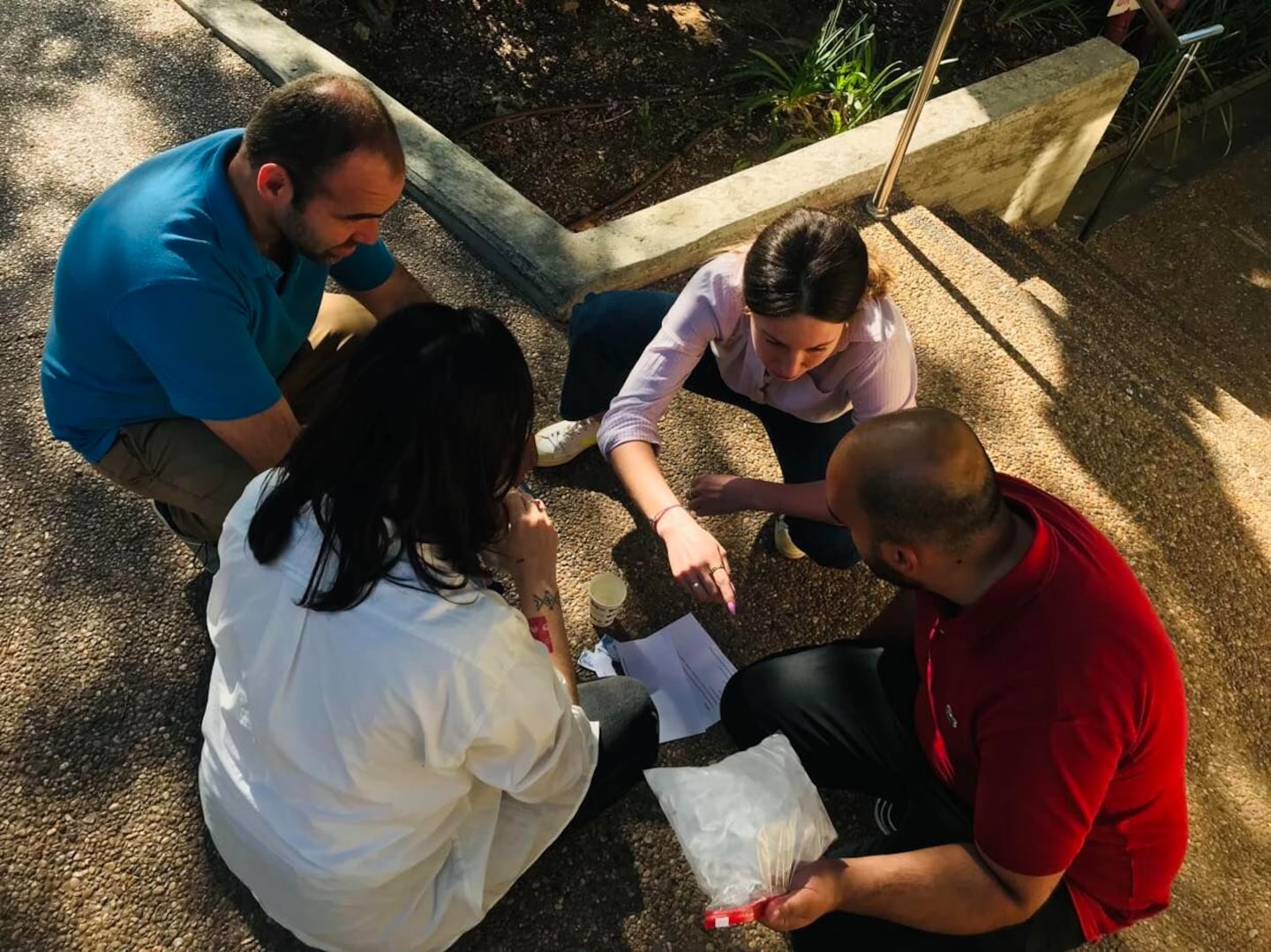The 20-year-old program has nearly 1,000 alumni pursuing careers in tech and entrepreneurship, doing policy work in government and nongovernment organizations, or earning degrees at universities such as MIT and Harvard. Some 94 percent of MEET’s participants said they are willing to work with people from the other nationality.
Get Starting Point
A guide through the most important stories of the morning, delivered Monday through Friday.
“Seeing Jewish Israeli peers as friends,” said Marana, “is a way to go beyond the socialization we go through when we’re older, that they are the enemy.”
In an embattled Middle East, hope sounds like a false promise. But MEET and another program with Greater Boston roots, 50:50 Startups, are trying to bridge the social, economic, and ideological divide through innovation and entrepreneurship. In each program, the idea is to create connection and understanding through shared professional interests, dialogue, and teamwork.
“We care about achieving practical technological pathways that would benefit all of us as humans living here,” said Shai Friedman, 50:50’s chief executive.
Amid the decades-old conflict, the two organizations emerged from university campuses to offer their own approach to Israeli and Palestinian coexistence. MEET was founded by three Israeli students at MIT and Harvard during the second Intifada in 2004 — an escalation of the conflict characterized by suicide bombings in civilian populations in Israel and an aggressive Israeli military operation in Palestinian villages in the West Bank.
The founders recognized an urgent need for peacemaking, and collaborated with MIT’s International Science and Technology Initiative, the school’s global engagement program, to encourage Israelis and Palestinian youth to work together on technology projects.
“Many of the kids don’t come to the program because they want to be agents of peace,” said Yaniv Sagee, MEET’s chief executive. “They come because they see it’s part of MIT and know this can transform their lives.”
Israeli and Palestinian participants in the MEET program work together on technological and entrepreneurial projects.MEET
MEET accepts 120 ninth-graders a year. Each class meets for 700 hours over three years, including an intensive three-week program in Jerusalem each summer. The curriculum consists of computer science and entrepreneurship classes taught by MIT undergraduate students and MEET alumni.
The students spend a third of the program developing socially-focused startups, such as an app that helps people report crimes to the police without compromising their identity.
For Marana, the program’s greatest influence came not from applying new technologies and developing business plans, but rather from sessions in which she discussed her background with Jewish Israelis, openly and without censorship.
“We argued about who suffered more, who had more killed, how it started,” she said. “There were barriers, but we have no other place to talk about this.”
Between political debates, Marana and 10 Israelis and Palestinians developed an idea for an app that aims to help more than 600,000 unemployed Palestinian youth in the West Bank find tech-related remote jobs in Gulf states. The app would outline a step-by-step process to search for jobs, identify gaps in users’ skills or education, and connect users with potential employers.
The idea won Marana’s group the first place in the Demo Day competition.
“I constantly had to fight stereotypes,” she said, “and the ways I used to think about the other.”
50:50 Startups operates as a tech incubator, bringing together young adult Israelis, Palestinians, and Palestinian citizens of Israel to develop startups from scratch.
It was founded in 2019 by two Israelis, entrepreneur Eran Heyman and Northeastern professor Amir Grinstein, and Ruud Kronenburg, a Dutch professor married to a Palestinian. 50:50 was created to address unequal business opportunities for Israelis and Palestinians.
“If you are an Israeli living in Tel Aviv you might have an uncle in a venture capital firm or you know someone from your military service and have more than 250 different programs available to you,” Grinstein said. “If you live in the Palestinian city Ramallah, you probably have none of that.”
 Northeastern Professor and 50:50 co-founder Amir Grinstein brought three participants of the program to Boston to speak with members of the Northeastern community.Alyssa Stone/Northeastern University
Northeastern Professor and 50:50 co-founder Amir Grinstein brought three participants of the program to Boston to speak with members of the Northeastern community.Alyssa Stone/Northeastern University
Between 30-50 people participate in each class, which runs for six months. The class divides into teams, which, working with tech industry professionals, form their own ideas for companies.
The ideas and the teams are winnowed to a handful. Those reaching the final stage head to Boston, where a Northeastern business class taught by Grinstein acts as consultants to refine the teams’ pitches. The teams then embark on a roadshow in Israel and Boston to present their ideas to potential investors.
Last year, the program initiated a two-week pilot accelerator program that takes place in Nicosia, Cyprus, allowing participation of Palestinians who weren’t able to attend sessions in Israel because of war-time travel restrictions.
Anna Pinchuk, an Israeli cybersecurity researcher, initially balked at attending the Cyprus program, concerned about how Palestinians in the program would view her. She studied at a university in a Jewish settlement city in the West Bank and served in a cybersecurity unit in the Israeli military as part of her mandatory service.
“I didn’t know how they would respond to my identity and where I come from,” she said.
Like many Israelis, Pinchuk had never interacted with Palestinians before the program. Then, she was standing shoulder to shoulder with Palestinians at a passport checkpoint in Cyprus, and soon after, collaborating with them on an app idea for a personal assistant calendar.
Her background came up in conversations, she said, but only out of of curiosity, not antagonism.
“The program’s magic is not in the workshops or lectures,” said Pinchuk. “It’s in the late hours at the end of the day when we all grab dinner together, explore the city, and spend time together as people.”
 Participants in the 50:50 incubator program create a tech startup from scratch.50:50 Startups
Participants in the 50:50 incubator program create a tech startup from scratch.50:50 Startups
Both programs have faced challenges because of changing domestic and international politics. The dismantling of the US Agency for International Development by President Trump eliminated $200,000, or a third of 50:50’s $600,000 a year budget. MEET, which operates on a $3.5 million annual budget, is losing $1 million a year in USAID funds through 2028.
And yet, said MEET CEO Sagee, “it turns out the program works even in the darkest of times.”
More people participated in the summer program than ever before, said Sagee.
Marana, among MEET’s 70 graduates this summer, said she and her teammates are still working together on their startup. She sees herself and fellow alumni as “empathetic leaders,” capable of dialogue and partnership that transcends hardline ideologies.
“I want my grandchildren to live in a different reality than this,” Marana said. “A reality that can only be achieved by seeing each other as friends ,teammates, and vehicles for a shared society.”
Yogev Toby can be reached at yogev.toby@globe.com.